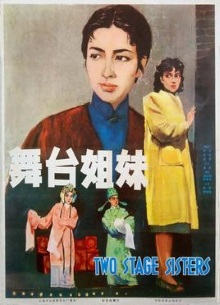
So I read about this in The Economist and thought that it might be a good idea of watch one of these as it’s considered a classic of Chinese cinema even though of course it’s explicitly Communist Party propaganda. Unlike most other films of its genre and period this one is very highly regarded outside of China and was made by Xie Jin, a member of the so-called Third Generation of Chinese filmmakers.
An opera troupe is performing in a small village when Yuehong , the daughter of the troupe’s music teacher discovers Chunhua, a girl who has run away from her adoptive family. The teacher persuades the owner of the troupe A’Xin to let her stay and be trained and so Chunhua and Yuehong begin performing together. Though A’Xin is greedy, Yuehong’s father protects Chunhua until he dies of an illness in the midst of the Sino-Japanese War. A’Xin then disbands the troupe and takes the two girls to Shanghai. He sells them to Tang, the owner of an opera theatre and the duo becomes an instant hit, displacing the aging former star Shuihua. Years later, the two are stars and while Chunhua remains true to her roots, Yuehong has learned to appreciate the finer things in life and agrees to marry Tang, retiring from the stage. Meanwhile Chunhua, after being incensed at Tang’s treatment of Shuihua is drawn into the growing Communist movement and decides to perform an opera that highlights the suffering of poor peasant women. This causes her to be censured by the Kuomintang government which still controls Shanghai.
This film is very much a product of its time and so allowances must be made for both production quality and its blatant moralizing tone. The attention to detail with regards to the opera performances is impressive and I liked the film’s depiction of village life. The scene of them performing on a makeshift stage by the river while audiences come on boats to watch them is quite remarkable. The film unfortunately becomes much more predictable and more like a Communist propaganda piece with clear-cut heroes and villains. The character of A’Xin for example was despicable before the move of Shanghai but he seemed to respect Yuehong’s father while he was alive so it didn’t seem impossible for him to be an ally of sorts. However once the battle lines are clearly drawn between the KMT and the Communists, every character basically becomes flat.
My wife also commented on another theme that appears to run through the film though I’m not sure how much of this was intentional: the heroes are almost all women and the villains almost all men. A defining characteristic of the Yue troupes shown in this film is that all of the performers are women so it makes for a remarkable scene when Yuehong rallies them to stand against A’Xin and Tang. Even more telling is that the person who effectively inducts Yuehong into Communism is a female activist reporter and that she chooses to play the character of an old peasant woman created by Lu Xun to condemn the capitalists. On the other side, in addition to the obvious villains and bullies, the KMT goons and even the judges who try to cover for the city’s mayor are men. It’s a nice reminder that at least at that stage the Communists were relatively egalitarian with it came to gender roles and the film can be thought as being at least somewhat feminist.
Overall I think this is an effective melodrama even if the director admits that the second half is weak due to the need to conform with societal mores at that time and the great tragedy is that even this was considered to be too lenient towards the bourgeois class when the Cultural Revolution soon after the film’s release. I also found watching it to be a valuable baseline to understand Chinese films of that era though I have to say that their quality is far short of Hollywood films made at around the same time.